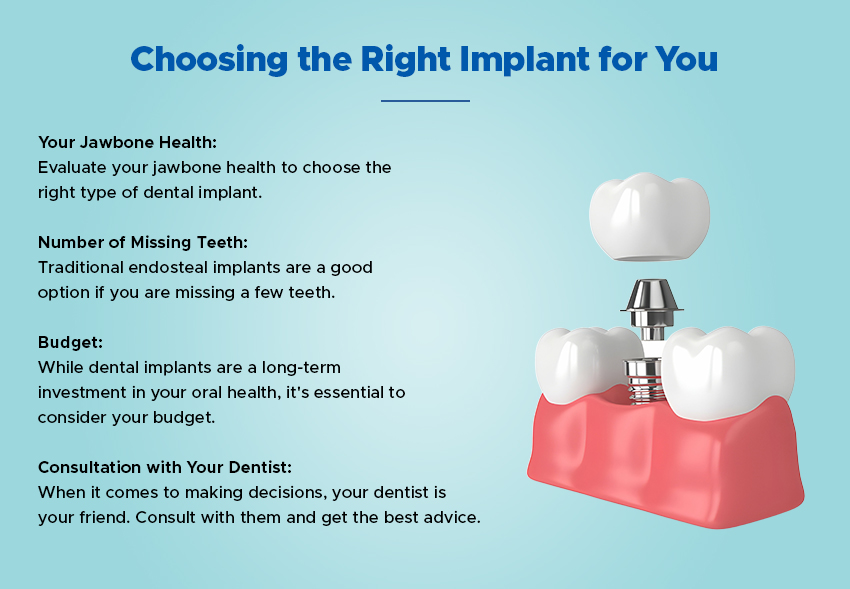Delhi Address:
36-A, Pocket 2, Sector 6, Behind Sector 6 Market, Dwarka, Delhi
Gurugram Address:
R2 136 M3M 65th Avenue Sector 65, Golf course extension road. Gurgaon Haryana 122101

n the world of dentistry, dental implants are like a saviour for your teeth. They're the go-to solution for replacing missing teeth and restoring your smile. But did you know that not all dental implants are the same? In this blog post, we'll break down the different types of dental implants so you can make an informed decision about which one is best for you.
Let's begin with the basics. Dental implants are strong, artificial tooth roots composed of titanium or other strong materials. They are inserted surgically into your jawbone to give your replacement teeth a solid foundation. Consider them as the securing anchors for your newly acquired teeth.
Endosteal implants, which resemble tiny screws and are placed directly into your jawbone to provide a sturdy foundation for your new teeth, are the most common type of implants that you can choose.
If you're missing one or more teeth and your jawbone is healthy, endosteal implants are the ideal choice.
After a thorough examination, your dentist will place the implants into your jawbone during a minor surgery. Once they integrate with the bone, usually in a few months, replacement teeth are attached.
Subperiosteal implants are metal frames placed on top of the jawbone, just under the gum tissue. Posts attached to the frame protrude through the gums to hold the replacement teeth.
If you have a shallow jawbone and are not a candidate for traditional implants, subperiosteal implants might be the solution for you.
Your dentist takes impressions of your jawbone and creates a custom-fit metal frame. The frame is then placed on the bone, and as the gums heal, it becomes firmly attached.
The All-on-4 technique strategically places four implants in your jaw to support an entire set of upper or lower teeth, providing a cost-effective and time-efficient solution for those seeking complete tooth replacement with fewer implants.
If you've lost most or all of your teeth and want a full set of replacement teeth with fewer implants.
Your dentist places four implants in areas of your jawbone with the highest bone density. This technique provides stability and reduces the need for bone grafting.
Zygomatic implants are longer than traditional implants and are anchored in the cheekbone (zygomatic bone) instead of the jawbone. It makes them an excellent alternative for individuals with severe bone loss in the upper jaw who may not be suitable candidates for other types of implants. This innovative approach ensures a secure foundation, restoring both function and aesthetics to your smile.
Individuals with severe bone loss in the upper jaw who may not be suitable candidates for other types of implants.
After careful evaluation, the dentist attaches the implants to the zygomatic bone, providing a secure foundation for the replacement teeth.

Choosing the right types of dental implants doesn't have to be overwhelming. By understanding the basics and considering your unique situation, you can work with your dentist to find the perfect fit for your smile.
So if you are still confused and want expert advice and treatment ofdental implant in Dwarka, Vital Dental Care is here to help. We are known as the best Dental Hospital in Dwarka that can take care of your oral health and give you the desired smile. Remember, a confident and healthy smile is just an implant away!
Answer: Dental implants are like artificial tooth roots made from strong materials. You might need them if you have missing teeth and want a reliable way to replace them. They help restore your smile and ensure your new teeth stay in place securely.
Answer:The best type of dental implant depends on your situation. Regular endosteal implants are a good choice if your jawbone is healthy and you're missing a few teeth. If you've lost many teeth, All-on-4 implants are efficient. Your dentist will help you decide after looking at your oral health.
Answer: Dental implants are an investment in your oral health, but there are different options to fit your budget. All-on-4 implants can be cost-effective for replacing multiple teeth with fewer implants. Talk to your dentist about payment plans or options that suit your financial situation.
Answer:Your dentist will ensure you don't feel pain during the procedure. They use local anaesthesia to numb the area, and in some cases, you might receive sedation to help you relax. After the surgery, you might experience some discomfort, but your dentist will provide instructions and, if needed, pain medication to manage any post-operative pain.

